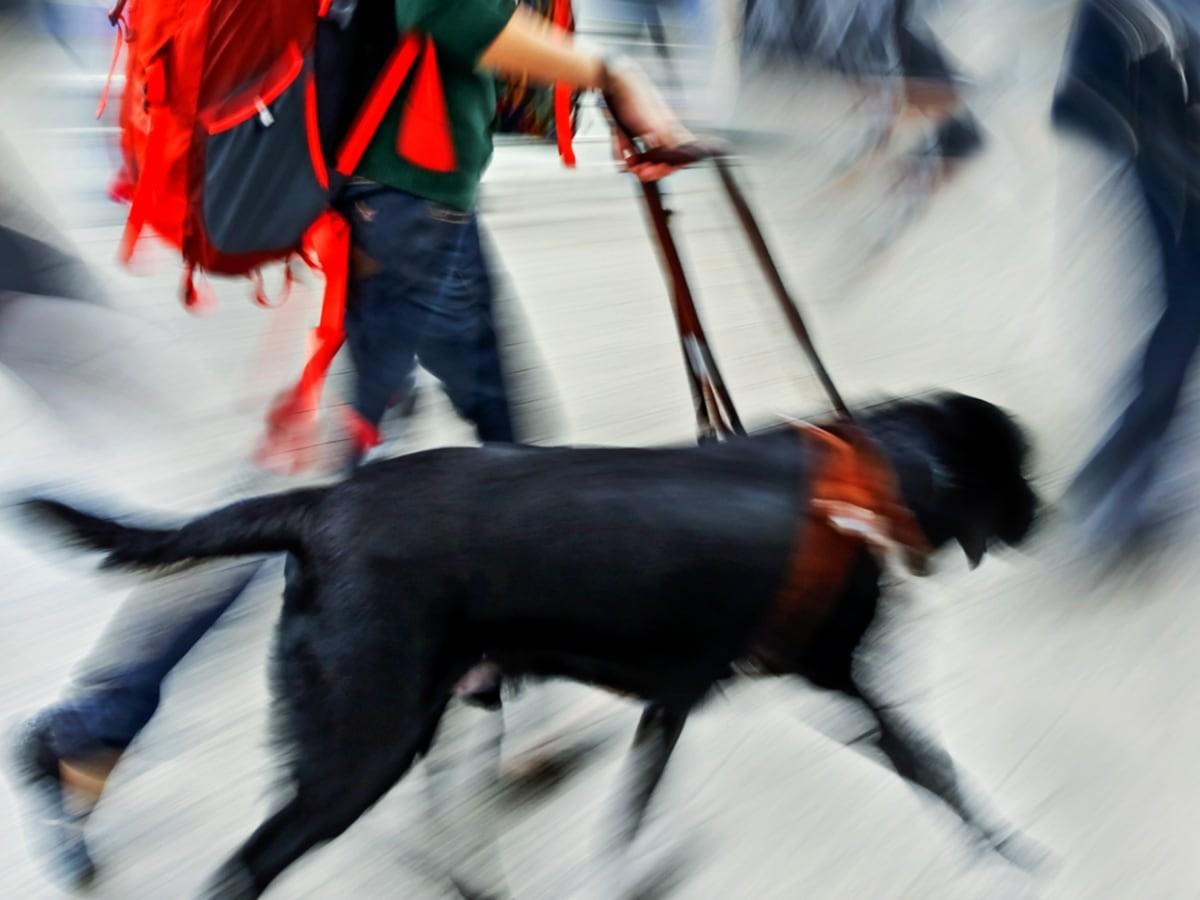Everything You Need to Know About Service Dog Etiquette
Stopping to pet every dog on the street is one of the best things about being alive, right, dog lovers?
While it may be hard to pass by a good boy or girl without giving them attention, in the case of service dogs, you have to resist the urge to interact. They’re actually working, so not distracting a service dog is just good human behavior.
As we know, ample studies have shown that dogs provide health benefits and improve happiness. Service dogs do all of this and more.
Here’s everything you need to know about service dogs and how you should treat them.
What is a Service Dog?
Service dogs have been trained to assist and perform tasks for people with disabilities. Also referred to as assistance dogs, these special pups have been aiding people for close to 100 years.
The Americans with Disabilities Act (ADA) defines service dogs as individually trained animals who are not pets, and are specifically trained to assist their handlers with tasks or activities directly related to his or her disability.
Kinds of Service Dogs
There are quite a few different types of service dogs. They each go through rigorous training usually prior to meeting their handler, but often after they’ve been matched with a specific person.
The most common and possibly oldest type of service dog are Guide Dogs for people who are blind. Here are some of the other types:
hearing dogs for deaf or hearing impaired people.
mobility assistance dogs for wheelchair bound people or those with limited mobility.
autism service dogs for those with Autism.
diabetic alert dogs can detect blood sugar highs and lows by scent and remind diabetics to take medication.
seizure response dogs protect and help people when they have a seizure.
PTSD service dogs for those who suffer from panic disorders, anxiety disorders, major depression, and more.
Service Dog Etiquette
It’s important to remember that these dogs aren’t pets, they are extremely beneficial to someone with a disability and are working animals. As aforementioned, they are trained to do specific tasks related to their handler’s disability.
That’s why it’s essential to know how to behave around these special pooches.
Here are a few tips and best practices for when around a service dog:
Don’t distract service dogs. Remember these dogs are working and their job greatly impacts the safety and health of another person. Unless their handler invites you to pet their dog, engaging with them (however cute) is a serious faux pas and can actually endanger the person.
Don’t allow your pets or children to distract service dogs. It’s important that you pay careful attention to your pets and kids and make sure they don’t distract a working dog either. If you’re traveling with your own pet and encounter a service dog, they likely won’t respond, they’re trained not to, but will your own pup behave? As a pet parent, it’s important to make sure they do.
Respond to a service dog actively trying to get your attention. These dogs are trained to alert other humans if there’s an emergency. If a service dog approaches you, their handler may be in danger and need your help.
Know that they’re legally allowed to go anywhere with their handler. The Americans with Disabilities Act protects service dogs and federal law doesn’t require that they wear service vests in order to be admitted into places. This means that these dogs can accompany their handlers in restaurants, movie theaters, public transportation, and so on.
Never offer food to a service dog. Again, they’re working and can’t be distracted. Many service dogs are also on strict diets and feeding schedules.
Emotional support dogs aren’t the same as service dogs. While these dogs are also working animals, therapy dogs and emotional support dogs are not classified as service dogs and are therefore not afforded the same privileges as service dogs.
Don’t Pass Your Pooch Off As A Service Dog
It would be nice to take your pup everywhere, we get that, but service dogs are an essential and important part of our society and their work is paramount for those with disabilities. Even if your dog is extremely well-behaved, passing them off as a service dog just to take them places with you adds to the stigma and mistrust that business owners sometimes have towards legitimate service animals. There are huge ethical implications of trying to disguise your dog as a service animal, so please be considerate and responsible to true service dogs.
Service dogs are special and deserve our respect.
We love all dogs, of course, but service dogs are truly a special “breed.” They’re trained to protect and care for human lives and their handlers, often children, rely on them wholeheartedly. Understanding their importance and the responsibility they have will make it easy to remember the appropriate way to behave around them.
If you have a special service dog in your life, their longevity and health are vital. If they are not already, consider protecting your service pooch with a dog insurance policy that keeps them, and you, safe and healthy. Find a pet health insurance plan that suits your needs to help look out for them, looking out for you.
